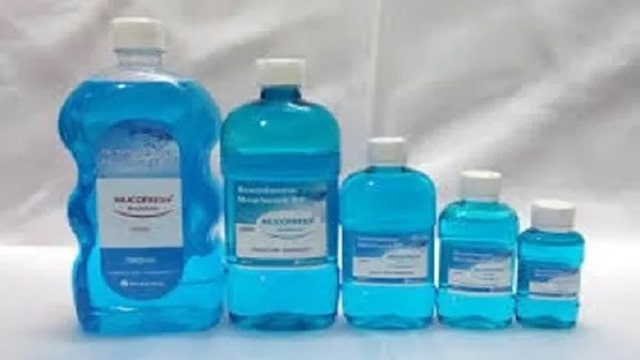Benzydamine hydrochloride is a locally acting non-steroidal anti-inflammatory drug (NSAID) with local anesthetic and analgesic properties. It is used topically for pain relief and anti-inflammatory treatment of the mouth, throat, or musculoskeletal system.
Although it is a non-steroidal anti-inflammatory drug (NSAID), it has a variety of physicochemical properties and pharmacological activities that are different from NSAIDs such as traditional aspirin. However, it facilitates the mechanism of action of benzydamine as a locally acting NSAID with local anesthetic and analgesic properties.
Benefits of Benzydamine Hydrochloride
Benzydamine hydrochloride has antiseptic, analgesic, and antipyretic properties. This drug is useful to help relieve pain and discomfort due to inflammation or infection in the mouth and throat.
Mouthwash and lozenges can be used to treat a number of mouth and throat problems, such as:
- Sore throat due to inflammation (pharyngitis)
- Oral ulcers (oral mucositis due to radiation therapy)
Benzydamine Hydrochloride Dosage
The dosage of benzydamine hydrochloride should be consulted with a doctor. However, in general, the dosage to treat mouth and throat pain or irritation is:
- Adults: As a 0.15% spray: 4-8 puffs every 1.5 -3 hours.
- Children: as a spray for ages <6 years 1 puff/4 kg (Max 4 puffs) 1.5-3 hours. Ages 6-12 years 4 sprays for 1.5-3 hours.
The recommended duration of treatment is ≤7 days.
In the form of topical medication or ointment for pain and inflammation of the joints, the dosage is:
- Adults: As a 3-5% preparation: Apply 35-85 mm (1-2 g) to the affected area, or up to 6 times daily in severe conditions.
The recommended duration of treatment is ≤10 days.
How to Use Benzydamine Hydrochloride
Benzydamine hydrochloride is available as a liquid mouthwash, oromucosal spray or topical cream. It is most commonly used as a local analgesic and anti-inflammatory medication to relieve painful inflammatory conditions.
The following are the rules for using this medicine that you need to know:
- Take the medicine as much as recommended for use.
- Gargle or spray the medication into your mouth (if as a mouthwash or spray).
- If the medication is as a topical cream, take the amount recommended, and apply only to the areas of the body that need it.
If you forget to use the mouthwash, use it as soon as you remember, then use your next dose as usual. However, if you forget to use the mouth spray or lozenge, skip the missed dose and use your next dose as usual.
Allow at least 1 hour and 30 minutes between doses. Do not take a double dose to make up for a missed dose.
Cautions in Using Benzydamine Hydrochloride
Be careful when using this medicine in patients with or with a history of bronchial asthma and in patients with kidney disorders. Do not give this medicine to children, unless prescribed by a doctor.
There is no information available about the use of benzydamine during pregnancy. Safety has not been established in pregnant women. It is also unknown whether this medication passes into breast milk. Use with caution while breast-feeding. Consult your doctor.
Benzydamine Hydrochloride Side Effects
Possible adverse reactions when using mouthwash or spray containing benzydamine hydrochloride include potent numbness or stinging in the mouth or throat.
Possible adverse reactions related to topical cream medications include increased sensitivity to sunlight, local itching, skin rash, redness, or swelling.
Benzydamine Hydrochloride Interactions
There is a risk or severity of bleeding may be increased when benzydamine hydrochloride is combined with the following drugs:
- Warfarin.
- Mercato.
- Methyl propionyl.
- Pyrrolidine.
- Carboxylic.
- Dimethoxy.
Benzydamine Hydrochloride Contraindications
This medication may not be suitable for some people. Tell your doctor or pharmacist before using this medication if:
- Have ever had an allergic reaction to benzydamine or any other medication?
- Have ever had an allergic reaction to NSAIDs, including aspirin, ibuprofen, or naproxen?
- Have ever had a runny nose, rash, or swelling of the skin (angioedema) or started wheezing after taking NSAIDs?
- Have liver disease (or have had this in the past).
- Have epilepsy or have had a seizure.
- Are pregnant, trying to conceive, or breastfeeding?

